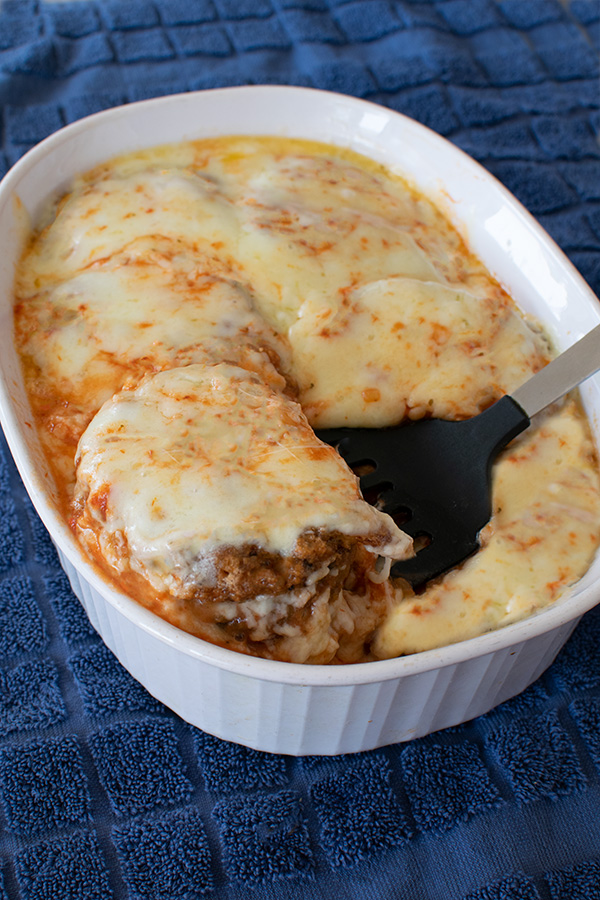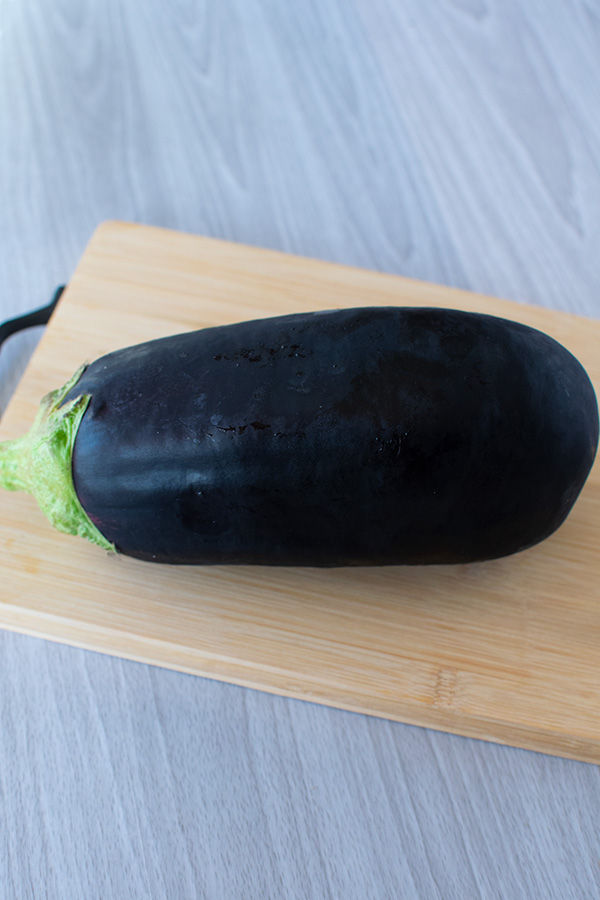Kosher for Passover Eggplant Parmesan recipe creates layers of delicious coated fried eggplant with sauce and cheese. Perfect for the week of Passover!

Kosher for Passover Eggplant Parmesan is an easy-to-make dish. When you read the ingredients and instructions, it may seem complicated, but while it is a little time-consuming, it really is a very simple recipe that everyone will love! Terrific dish for the holiday!
A little of my cooking background
I really wanted to title this blog “If I can make it, anyone can” because, honestly, if I can make it, anyone can.
I never really liked cooking, and when I was single, a meal for me meant grilled cheese, eggs, tuna, or something else that didn’t require effort or time.
When my kids were young, I was still able to get away with preparing only a small variety of easy meals, but the older they got, the more dishes I learned to make at their request.
Still, I insisted on keeping it simple.
Honestly, I never understood why some cooks unnecessarily complicate meals. I have seen recipes that have several ingredients that don’t really seem to add much, if anything, to the dish. So, why bother?
It has always been important to me that whoever eats at my table will have plenty to enjoy, and that includes my kids (I never agreed with the “You will eat what is served or you won’t eat” ideology), and, because I keep it simple, I can prepare a variety of dishes in a relatively short period of time.
I have a philosophy regarding being a great cook: Prepare food according to the tastes of those who will be eating it, and they will love your cooking!
As far as I am concerned, start with the basic ingredients that make the dish what it is, adapt according to taste, and voila! You are an amazing cook!
The bottom line is that while there are certainly delicate recipes out there for specialty dishes, making delicious meals doesn’t have to be complicated or time-consuming. It’s not difficult to impress—just make sure it tastes good.
While some of the recipes on my blog are more time-consuming than others, they are all tried and true, easy-shmeezy!
Of course, one always has to consider the conditions under which they cook. Weather (humidity, heat, cold), different types of ovens, different qualities of pots, etc.—all of which can affect your cooking and baking.
Nevertheless, as I said, if I can do it, anyone can!
Food on Passover
Torah-observant Jews do not eat chametz (the fermented products of five grains: wheat, spelt, barley, oats, and rye).
In addition, Torah-observant Ashkenazi Jews do not eat kitniyot (or kitniyos as pronounced in Ashkenazi Hebrew). These include legumes, corn, rice, and similar foods that were deemed forbidden to eat by rabbis in the medieval period and are still not eaten today. Sephardi and Mizrachi Jews do not follow this tradition.
Many observant Ashkenazi Jews will not even eat the derivatives of these kitniyot, while others do (each family holds their own traditions regarding this).
Then, there are Ashkenazim who don’t eat “gebrokts” (or gebrochts).
Gebrokts (gebrochts) means “broken” in Yiddish, and in this case refers to matzo that has absorbed liquid. Not eating gebrokts is observed by many in the Hasidic Jewish community and Ashkenazim who have taken on this tradition where they basically don’t mix anything wet with matzo.
So, things like matzo sandwiches, fried matzo, and even matzo balls are a no-no for them.
There is a joke that sums it all up:
On Passover, we should remember people who have little to eat on this holiday. They are called Ashkenazim.
Over the years, I have learned to adapt “normal” food for Passover so that my family won’t complain about boring, tasteless, or repetitive meals.
I find that having good food and variety makes the week of Passover a very pleasant experience, and I hope this recipe will help make yours just that!
If you just want eggplant cutlets without the sauce or cheese, try Fried Eggplant Cutlets for Passover!
A little about eggplants
The eggplant is native to India and Asia, where it can be found growing wild, and it is believed that eggplants were brought to Europe sometime during the 7th or 8th century.
Australians and Americans call the vegetable eggplant, while in England it is called an aubergine, from the French word for this vegetable.
Because of its meaty texture, eggplant is used instead of meat in some vegetarian versions of meat recipes.
While there are a variety of types of eggplants, the one for this recipe is the large, egg-shaped (or teardrop-shaped), blackish-purple one with the meaty inside.

Eggplants have health benefits as they contain antioxidants like vitamins A and C, which help protect your cells against damage, and are low in calories.
About cooking eggplant
Eggplants can be roasted, baked, steamed, deep-fried, or sautéed.
Before cooking an eggplant, cut off the top part where the green is (called a calyx). The bottom tip should also be removed, but this is not imperative. The skin is perfectly fine to eat, but it must be cooked well, otherwise it may come out chewy.
This recipe can use either peeled eggplants or eggplants with the skin (having the skin on will not ruin the recipe).
Eggplant is naturally a little bitter. If you find that to be the case, you can draw out the bitterness by sprinkling it with salt and letting it sit a while. If you are using slices or pieces, slightly salt after cutting. I have personally never found this to be a problem when cooking with eggplants
Using salt before cooking can help prevent the eggplant from absorbing too much oil and becoming greasy if using oil with the eggplant recipe (I normally just pat the pieces with a paper towel if need be).
If you do use salt, MAKE SURE to rinse it off before cooking the eggplant, or the salt will become a part of your dish!
Personally, I have never salted my eggplants before using them (and I have used eggplants in two countries) and have never had any problem with bitterness, but if you have any concern, please do.
If a recipe calls for frying, but you prefer not to do so because of the calories the oil will add to the recipe, you can spray with cooking oil and bake instead.
Kosher for Passover Eggplant Parmesan

Very easy eggplant parmesan, kosher for Passover
Ingredients
- 2 large eggplants
- 6 - 8 eggs (start with 6, add more if needed)
- 1 1/2 - 2 cups matzo meal or matzo cake meal
- 1 pound of a mixture of shredded mozzarella and Parmesan, as desired (I only use mozzarella), kosher for Passover
- 24 ounce jar of marinara or pasta sauce, kosher for Passover
- kosher for Passover oil for frying
Instructions
- Heat oil in a large frying pan on medium heat (approximately 1/4" - 1/3" high).
- Cut off ends of eggplant and peel (or leave the skin on, if desired - I leave the skin).
- Slice eggplant into slices of approximately 1/2" wide, either lengthwise or into disks.
- Pour eggs and matzo meal/matzo cake meal into separate bowls large enough to accommodate dipping the eggplant slices.
- Dip each slice into egg, then matzo meal/matzo cake meal, then egg again, making sure the slices are well coated.
- Place in pan with oil that has been heated on medium.
- Fry one side until golden brown, then flip and fry on other side until golden brown (you should be able to easily stick a fork through when they are ready).
- Remove and place on plate covered with paper towels to drain.
Frying the eggplant
Preparing the Eggplant Parmesan
- Place a layer of eggplant on the bottom of a 9"x13", casserole dish, or other suitable size baking pan.
- Pour marinara or pasta sauce evenly over the layer of eggplant (determine how many layers of eggplant you will have and pour that fraction of sauce on to each - ex if you have 4 layers, then 1/4 of the sauce will be poured on each).
- Add the cheese over the sauce (again, divide according to the number of layers you have).
- Repeat until you have used up all the ingredients.
- Place in oven and bake on 350° or until the cheese on top has melted well.
Notes
1) Feel free to use seasoned coating, as desired.
2) Most people only use one coat of egg and do not redip after the matza meal.
3) The amount of eggs you will need depends on how well you coat. That is why I write 6-8. Chances are you won't need them all, but having a nice amount allows for easier coating and starting with a smaller amount and have more at the read to add if needed helps prevent waste.
Nutrition Information:
Yield:
12Serving Size:
1Amount Per Serving: Calories: 504Total Fat: 15gSaturated Fat: 6gTrans Fat: 0gUnsaturated Fat: 7gCholesterol: 155mgSodium: 665mgCarbohydrates: 71gFiber: 6gSugar: 11gProtein: 21g
Holly Zendels
Saturday 19th of April 2025
Great recipe for Passover! Is there a website I can go to get more?
Lori
Thursday 29th of May 2025
easyshmeezyrecipes.com. Just put Passover in the search bar.
Lori
Saturday 19th of April 2025
The same one: easyshmeezyrecipes.com. :)